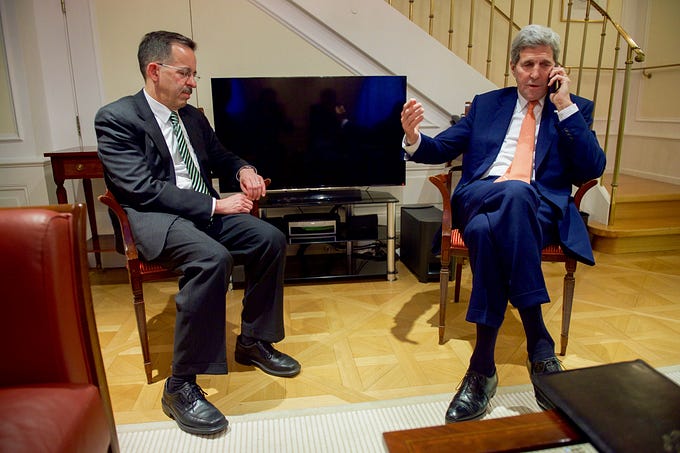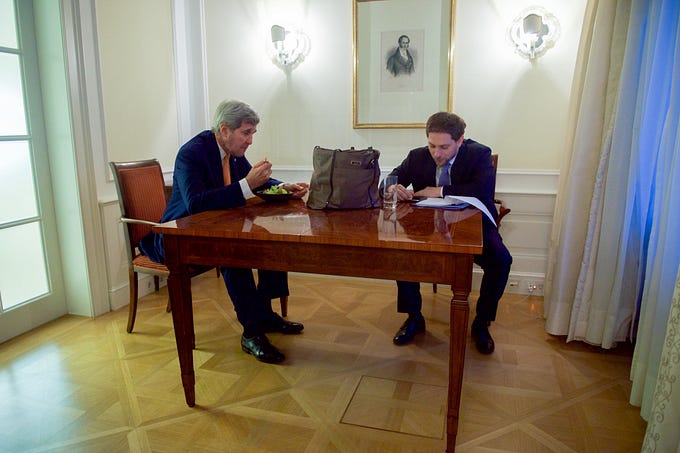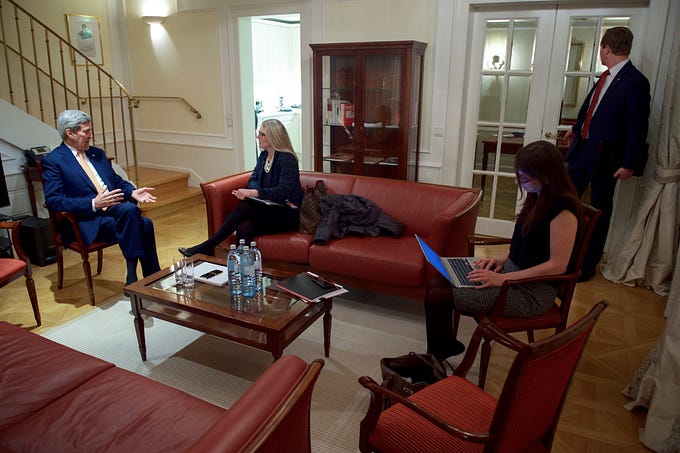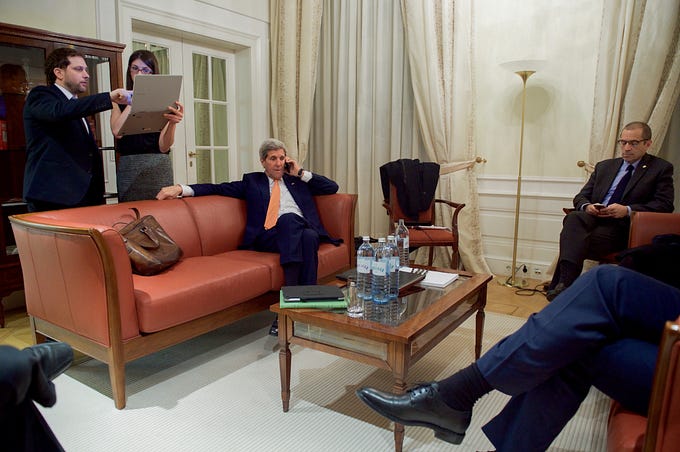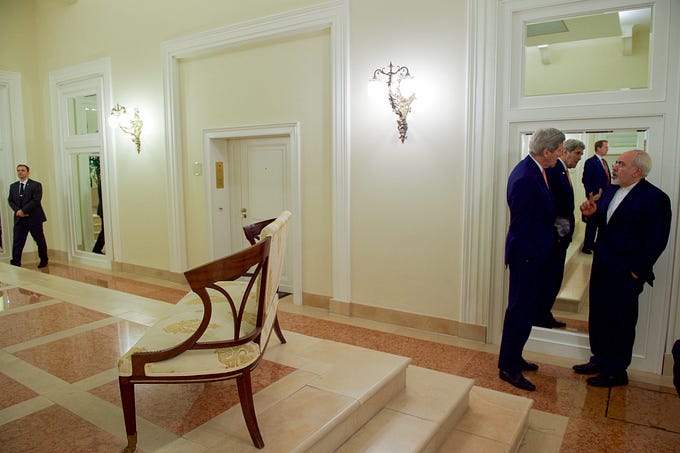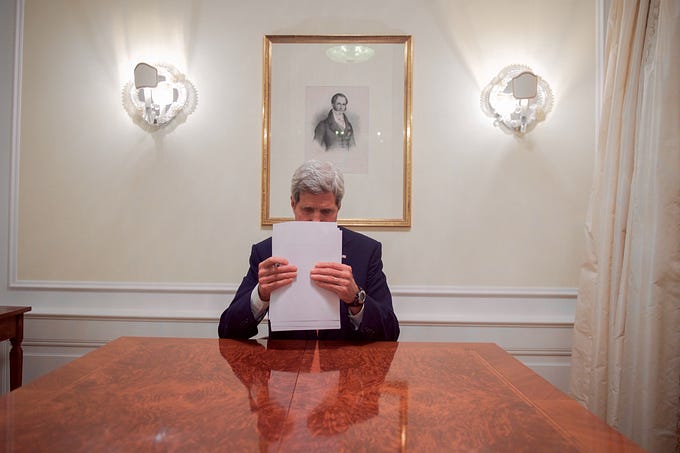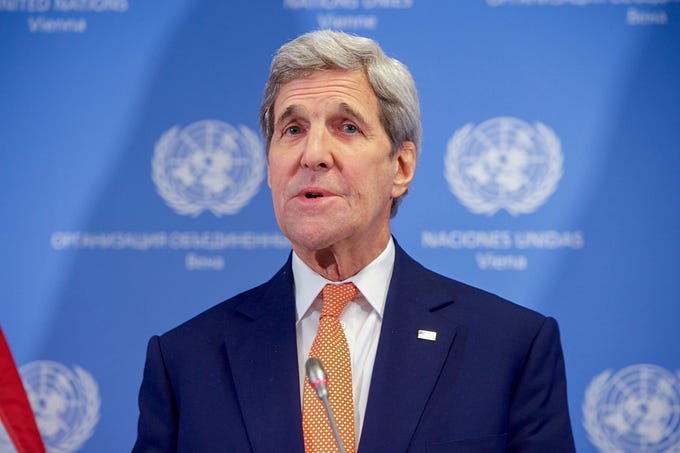The Cold War may be over in the Western imagination for a number of reasons, but the triumph of cold hard cash is one of them. Russians have bought nearly five percent of the premium London properties in 2013. They’ve kept the tills full at Harrods during an “austerity” economy. They’ve sent their children to elite boarding schools and Oxbridge colleges, paying full tuition fees. And they’ve shoved their questionably-gotten gains into British tax shelters or financial institutions. In return, the political establishment, be it Labour or Tory, has only asked for more.
I lived in London for close to three years, from 2010 to the end of 2012. For the better part of half that period, I spent a great deal of time sussing out the connections between two elites: where the interests of those in positions of financial or political authority in Britain intersected with those of the Russian plutocracy. I left convinced that the reason Putin was able to get away with irradiating Alexander Litvinenko in broad daylight was that he understood that the brutality of Marxism-Leninism was more readily applied in the service of Mammon. Murder could now be weighed as a necessary price to pay for realpolitik. Western democrats became hypocrites in the face of consultancy contracts or low-cost oil and gas. Everyone wants to get rich, no one wants to fight money, however dirty or blood-soaked it may be. As the Economist phrased it during those frenzied months of tracing the source of a radioactive isotope through Piccadilly and beyond, “British diplomats’ biggest worry is not that Scotland Yard will be flummoxed, but that it might succeed” in identifying Litvinenko’s killers. This grim saga continued all through my time in England. The British Home Office last year, under a new administration, cited “international relations” in rejecting Litvinenko’s widow’s call for a public enquiry into her husband’s assassination seven years earlier. A British High Court judge has only just last month ordered the government to reconsider its decision. The siloviki, meanwhile, hug themselves with glee to watch as Scotland Yard reaches for the Geiger counter whenever a seemingly healthy Russian emigré is found dead in Surrey.
Still, there were those trying to end this sordid special relationship. Occasionally I’d get an email from, or have a meeting with, what was then known as the UK’s Financial Services Authority, a quasi-judicial regulatory body that has since cleaved into two separate organizations. The FSA—not to be confused with the anti-Assad rebels in Syria—were always interested in hearing what I’d come up with, but they’d confess immediately that they were hamstrung when it came to doing anything but keeping files on such-and-such finding. “We’re up against all of Downing Street, all of the City,” I remember one enforcement agent telling me, the City being the synecdoche for London’s financial centre, its Wall Street. He might have added a media that was itself hamstrung by Britain’s ludicrous libel laws.
More frustrating was the fact that the funny money was not so terribly obscure or recondite anymore thanks to Britain’s having become a favored jurisdiction for Russians looking to sue each other. As Oliver Bullough points out in the New Republic, “60 percent of the London Commercial Court’s workload now comes from Russia and Eastern Europe, and the pay-offs are huge.”
Alexey Navalny, the leader of the opposition in Russia as well as its foremost anti-corruption campaigner, published an op-ed in the London Times in 2012 in which he called for the Brits to adopt legislation similar to the U.S. Magnitsky Act, which aims to blacklist and sanction Russian officials guilty of gross human-rights violations. In Britain, such a law was needed even more urgently, Navalny wrote. “Local banks apply meagre ‘know your client’ procedures to vet applicants: a passport copy and a utility bill are all that is needed to open an account at any London-based private bank. Then, as if by magic, funds pour into the UK as clean capital, free from any taxation or further scrutiny. Getting the right to stay permanently in the UK with an investor visa is just as easy; all that is needed is a minimum of £2 million in personal assets.”

Moreover, where British banks weren’t doing the work, Russian ones were. I’d later work with Navalny’s Foundation for Fighting Corruption on a report it released on VTB Group, which is 60 percent state-owned by the Russian government. Originally Vneshtorgbank, which was formed in the 1990s following Mikhail Gorbachev’s breakup of the Soviet State Bank of Russia, or Gosbank, it was rebranded VTB in 2006. Today, the bank has a presence in over 20 countries, with assets amounting to $230 billion. In 2011, it took in upwards of $712 million in deposits in France and Germany, including from those countries’ pensioners. In 2007, as a brainchild of Putin, it inaugurated a “People’s IPO” designed to prompt ordinary Russians to become minority shareholders. Small business-owners to babushkas were encouraged to invest in what then-Prime Minister Putin called a “stable” growth vehicle; 130,000 lined up to buy at the offering price of 13.6 kopecks a share, making the IPO the largest in the world that year. Yet days after the IPO was launched, VTB’s stock price dropped; then it tanked, following the global economic crisis, driving the stock down to 1.9 kopecks. Putin tried to correct for this in 2012, by forcing VTB to buy back minority shares from only the IPO investors, at the original share price of 13.6 kopecks. Institutional investors were excluded from this act of czarist munificence and were rightfully furious for being cheated. Rinat Kirdan of Aton Capital told Bloomberg: “Over the years we have seen considerable evidence support in the view that VTB is more a state vehicle than a pro-oriented or shareholder-oriented business.”
The bank’s investment arm, VTB Capital, established a presence in London in 2008, in a building formerly occupied by Lloyds. Not longer thereafter, VTB went to court in London to reclaim losses. Another High Court Justice found in 2012 that “[i]t is not clear from the evidence presently available what, if any, due diligence was carried out by or on behalf of either VTB Moscow or VTB.” This case, involving the purchase of six Russian dairy farms, saw VTB issue a $225 million loan to a company whose collateral was worth less than $45 million. Moreover, the buyer of the farms, the bank later claimed to have discovered (though has not proven), was also the owner. The loan defaulted within a year. In January of this year, one of the defendants in the case, Konstanin Malofeev, filed a $600 million suit against VTB—also in London’s High Court.
Other allegations of rampant mismanagement or crony lending schemes designed to enrich bank executives continue to dog VTB. So have more serious charges that it has been keeping accounts for a mass murderer.
Last September, Senators Kelly Ayotte, Richard Blumenthal, John Cornyn and Jeanne Shaheen asked the U.S. Treasury Department to stop “Russian banks that have repeatedly undermined American, European Union and United Nations sanctions by helping the Assad regime in Syria.” VTB was one of them, although spokesmen for the bank denied that it had taken any deposits from either Assad or any other member of the “Syrian leadership.” A Syrian state-controlled newspaper disagreed; in 2011 it reported that the Syrian Central Bank did indeed have accounts with VTB, as well as Gazprombank—the financial arm of the Russian gas giant—and Vneshekonombank (VEB). Both of these banks are also owned by the Russian government.
Actually, Damascus has been a prominent third party in more recent Londongrad hiccups in the media. Consider the case of Vladimir Lisin, Russia’s second-wealthiest man, with a net worth of $15.9 billion, according to Forbes. Lisin was the vice president of Russia’s Olympic Committee for the 2012 London Games, a role that granted him temporary diplomatic status in Britain. In June 2012, I discovered that a Russian cargo ship called the Professor Katsman, which had already been accused by Western diplomats of running weapons to Assad via Syria’s Russian-maintained port at Tartus, was owned by Lisin through a series of multinational shell companies. As with a lot of Russian businesses, the ownership was concealed in a matryoshka dolls-like series of parents and subsidiaries. The boat was technically registered by a Maltese concern called Rusich 12 Ltd, which was owned by a Cypriot one called Russich-NW Shipholding (PDF), which belonged to North Western Shipping, a Russian entity, which was controlled by Universal Cargo Logistics (UCL) Holding, an international transportation group with corporate addresses in Moscow and Amsterdam. UCL Holding is widely acknowledged as Lisin’s shipping behemoth. Its Amsterdam address, as I noted at the time in the Telegraph, gave sufficient grounds for the Netherlands and other E.U. members-states, which had imposed an arms embargo on Syria, to investigate whether or not the Katsman had violated European law. Moreover, if the British government itself investigated this ship and found evidence that it had been shipping weapons to Syria, then what might be doable to any assets or properties owned by Lisin in the UK, such as his 3,300-acre Aberuchill Castle estate in Perthshire, Scotland?
After my story was published, and a more expansive follow-up appeared in the Sunday Telegraph, UCL Holdings issued a press release stating: “At the moment we don’t have any prove [sic] that Profesor [sic] Katsman had delivered to Syria anything of a military nature that can be used against civilians.” This was itself a curious way of phrasing the matter because the Russian Foreign Ministry back in 2012 liked to say that hardware such as refurbished attack helicopters or spare parts for them wasn’t being used against civilians in Syria (even though it plainly was); it was “defensive” in nature. Also, Lisin threatened to sue the Telegraph if it pursued this line of inquiry further, according to another journalist at the newspaper. As for Malta, the Netherlands, Cyprus and Britain, not a peep was heard about the Katsman’s cargo or its wealthy, Olympic-loving owner. Nor did the Syrian opposition get any joy when it took up the matter itself.
In some cases, the journey of dubious rubles through, past or straight into Blighty involves senior Russian officials who, no matter what accusations may be leveled against them with however much eyebrow-raising evidence, always remain senior Russian officials.
Igor Shuvalov is the first deputy prime minister in Dmitry Medvedev’s cabinet and Putin’s longtime economic consigliere. He’s also the Kremlin’s “sherpa” to three important international bodies: the World Trade Organization, which Russia joined over a year ago after much U.S. string-pulling on its behalf; the Davos World Economic Forum, where the oligarchs turn up each year; and the G8, from which the U.S., along with every other G7 nation, has now pulled its attendance at the forthcoming summit in protest of Moscow’s invasion of Crimea. Shuvalov won acclaim at home and abroad for being the man to lure the 2018 World Cup to Russia. As you might expect, then, he’s done very nicely for himself, but he’s had help.
In 2004, Alisher Usmanov had an idea. The Uzbek-born industrialist who would later become a percipient investor in Facebook, Groupon and Twitter, and as well as a major shareholder in Britain’s Arsenal Football Club, had decided to buy a 13 percent equity interest in an erstwhile Anglo-Dutch steel manufacturer called Corus Group, which was then a whisper away from bankruptcy. (Today, Corus Group has become Tata Steel, having been acquired by the Indian conglomerate; it’s also the second largest steel manufacturer in all of Europe.) To purchase this equity interest, Usmanov needed $319 million. And so the financing for this transaction, which drew the attention of U.S. Securities and Exchange Commission at the time, came by way of a Bahamas-registered company called Sevenkey Limited. The owner of that entity was one Olga Shuvalova, Igor Shuvalov’s stay-at-home wife and fellow former law school classmate. Olga’s declared income was $12 million in 2008, $20 million in 2009, and $10 million in 2010.
As Barron’s reported in 2011, the entirety of the $49.5 million was deposited in a Sevenkey bank account just weeks before the money was then transferred to Gallagher Holdings, a company registered in Cyprus, through which Usmanov bought up his Corus stake. The transfer of the money was arranged, Barron’s said, by a man called Eugene Shvidler, another billionaire oligarch who has both Russian and American citizenship.
Shvidler has since admitted in a separate British High Court case that for the last 10 years he has managed all of the business interests of his dear friend Roman Abramovich, still another lucky enlistee in the nine-figure fortune club. Abramovich is today the ninth richest man in Russia, with a net worth of $12.1 billion, according to Forbes. Having formerly been successful in keeping head below the parapet or out of the spotlight, Abramovich has in the last decade become a conspicuous fixture in the tabloid press because of his ownership of the revered Chelsea Football Club in west London, the purchase of which in 2003 was rumored to have been personally sanctioned by Putin himself, as was Abramovich’s divorce from his second wife, a former Aeroflot stewardess, in 2007. So close are Abramovich and Shvidler that the latter is sometimes referred to as former’s “representative on earth;” so intimate are they that, in 2006, Abramovich “gifted” to Shvidler Le Grand Bleu, a luxury yacht that came with its speedboat, helicopter and indoor aquarium. Together, they also form the majority ownership of Evraz, a Britain-based steel and mining company that is traded on the FTSE 100 Index of the London Stock Exchange and employs 100,000 people worldwide.
But what’s interesting about the “loan” made by Olga Shuvalova’s Sevenkey Limited to Gallagher Holdings—apart from the obvious question of where the unemployed wife of Putin’s trusted economic advisor got $49.5 million to lend to anybody—was that the stated level of interest had been set to five percent per annum. And yet, Gallagher ended up reimbursing Sevenkey to the tune of $119 million from 2005 to 2007: a rate of return of more than 40 percent. In other words, Olga Shuvalova, and by extension her public servant husband, more than doubled their money in the space of three years.
What else was noteworthy about this deal?
Recall that Usmanov said he couldn’t raise money from banks to finance his purchase of 13 percent of Corus’s equity. Well, according to the 2006 audit of Gallagher Holdings, he could and did. In fact, that audit disclosed nothing about a $49.5 million loan coming from Sevenkey, but plenty about other loans Usmanov managed to secure, at the more gentlemanly rate of nine percent annual interest, to help finance his investment.
Sevenkey has altered its ownership structures over the years, but not its ultimate legal beneficiary who was and remained, as of 2011, Olga Shuvalova. Its current sole shareholder is a company called Severin Enterprises, which is registered in the British Virgin Islands, a dependent territory of the UK. Meanwhile, Sevenkey’s corporate secretary is a man called Alastair Tulloch, a London-based attorney; its director is another Brit called Sean Hogan. When last I looked up Hogan on the UK Companies House website, I discovered that he has been a nominee for 782 companies registered in the Britain.
Prior to 2008, Sevenkey paid no profits to its owners; it was used to manage the assets of the Shuvalov family, which include or once included a Jaguar, a few Mercedes, two limos, apartments in Russia, Austria and London, and “District 4”—a giant villa once frequented by R&R-seeking members of the Soviet Politburo. Abramovich is a neighbor.
After news of the Shuvalov affair broke in the international financial press, the Russian General Prosecutor’s Office opened an investigation, then closed it, claiming it had found no evidence of any illegality or untoward behavior in this cozy arrangement between and amongst two prominent oligarchs and the Kremlin’s influential financial advisor. Moreover, the Office declared, the Shuvalovs were good and regular Russian taxpayers, having replenished the public coffers even on the money made from the Sevenkey-Gallagher transaction. It apparently mattered not at all that Shuvalov later served, from 2008 to 2009, as head of a state commission on stabilizing the distressed Russian economy, a commission which signed off on the issuance of stimulus subsidies to various private enterprises. One such recipient of $30 billion in state guarantees was Metalloinvest, Russia’s largest iron ore company. Metalloinvest is owned by Alisher Usmanov. In 2013, he was named not only the richest man in Russia by Forbes, but also the richest man in Britain by the TheSunday Times, which reckoned that his net worth currently hovers at around $22 billion.
To make matters even more intriguing (and incestuous) Shuvalov has insisted that he and his wife got the money for the Gallagher loan from dividends earned through a 0.5 percent stock option in Sibneft, an oil company created in the mid-1990s for the purpose of rapid privatization. Brits have grown quite familiar with Sibneft over the last few years. It was featured prominently and repeatedly in court room epic drama of “Berezovsky v Abramovich,” the most expensive civil litigation in British history, initiated by Boris Berezovsky, the now-deceased Russian oligarch who did more than any other person to facilitate Putin’s ascent to the presidency in 2000, then squandered his enormous wealth trying to unmake that disastrous decision. Berezovsky had claimed that, because he’d fallen afoul of Putin in the early aughts and been driven from Russia, he’d been forced to sell his stake in Sibneft for much lower than what it had been worth at the time, and so Abramovich owed him $5 billion in damages. Still another High Court judge found otherwise and ruled in defendant Abramovich’s favor, lambasting Berezovsky as an “unimpressive, and inherently unreliable, witness,” not long after which the plaintiff committed suicide by hanging himself in his own bathroom in Surrey— at least according to the official coroner’s report, which many Russians in both London and Moscow are loath to believe. Meanwhile, Lord Sumption, Abramovich’s defense barrister, is said to have cleared a cool $5 million in legal fees and now has a seat on the British Supreme Court. It was in “Berezovsky v Abramovich” that Shvidler helpfully testified to managing all of Abramovich’s business affairs for the last decade.
But the notion that Shuvalov made a killing via a mystery stock option for a now vanished Russian oil company sounded fishy to many. “What’s the reason for giving an option to Shuvalov in that period of time when he was not an official [of Sibneft]?,” Navalny wrote in 2011, adding that any such stock option would have emerged in later corporate due diligence performed on the company for its merger in 1998 with Yukos, Mikhail Khodorkovsky’s subsequently confiscated oil giant. (Full disclosure: I work for the Institute of Modern Russia, a New York-based think tank, the president of which is Pavel Khodorkovsky, Mikhail’s son.)
Another Russian opposition figure, Natalia Pelevina, raised the Corus investment with both Britain’s Serious Fraud Office, citing Usmanov and Abramovich’s residency in the UK, and with the F.B.I, citing Shvidler’s American citizenship. Pelevina told me that neither agency has paid much attention to the case, although others clearly have done. She has received death threats in Moscow for kicking up a fuss about this affair. A little over a year ago, she said that she’d been passed messages from anonymous parties through her own lawyer informing her: “When we do you, it won’t be clean like [Anna] Politkovskaya. It’ll be a drunkard smashing your head in with a cinder block.” (I’ve obtained Pelevina’s permission to relay this threat publicly.)
Finally, even those with the ear of the British monarchy have benefited from life in Londongrad. Earlier I mentioned that Abramovich and Shvidler’s largest known investment in Britain is Evraz, the London Stock Exchange-traded steel and mining enterprise. A “senior, independent non-executive” member of Evraz’s board of directors and a member of its Audit Committee is Sir Michael Peat, who was formerly Keeper of the Privy Purse—i.e. Queen Elizabeth’s treasurer—and the principal private secretary to Prince Charles. Sir Michael’s annual compensation for services rendered to Evraz is £250,000 or $418,000, which isn’t bad for a little independent, non-executive corporate advisement and accountancy. But there appear to be other perks to enjoying a close relationship with two of Russia’s most recognizable oligarchs.
On January 3, 2012, Shvidler was appointed (PDF) to the board of MC Peat & Co LLP, a boutique investment firm established by Sir Michael’s son, Charlie Peat, in order to develop “distribution contracts in Russia, the CIS and the Middle East,” as the company’s website has it. Two days later, on January 5, 2012, MC Peat & Co LLP took out a loan in the amount of £2.73 million, or $4.5 million. The issuer of the loan was an Aruba-based company known as Horizon Investments AVV, which, according to the Department of Civil Aviation in Aruba, formerly owned an EC-135 model Eurocopter. The base of operations for that aircraft, as of 2004, was listed as “United Kingdom—Embarked on the Motor Yacht ‘Le Grand Bleu.’” That yacht, as you may recall, was given as a present by Abramovich to Shvidler in 2006.
Charlie Peat denied to me by email that his investment house was lent any money from Roman Abramovich. However, when I asked if the £2.73 million loan for Charlie’s investment firm might have been provided by Abramovich’s representative on earth, I was referred to Shvidler’s press office. (That office never responded to my inquiries.)
Evraz’s 2011 annual report did disclose that its board of directors considered “an arm’s length business arrangement between one of the non-independent directors and the son of Sir Michael Peat…and satisfied itself that his arrangement has no impact on Sir Michael Peat’s independence.” “Arm’s length” is a nice way of putting it, although Sir Michael and Shvidler may have recently found they needed still more length. In May 2013, Shvidler quit the board of MC Peat & Co LLP. The lending company of the £2.73 million loan is also no longer listed as a helicopter-owning shell in Aruba.
As a result of Russia’s invasion of Crimea, the Russian economy has taken a beating. The Russian Trading System indexed dropped 12 percent on Monday, though seems to have recovered somewhat over the last two days. Gazprom’s stock has sunk more than 18 percent since February 18; VTB’s stock is down 20 percent since the Ukraine crisis hit. With news today that Crimea’s parliament, led by a gangster known as “Goblin,” has just voted to join the Russian Federation, the market in Moscow dipped still further. The ruble, says VTB Capital, is as much as 8.5 percent behind the emerging market average index, with Ukraine accounting for 2.0-3.0 percentage points of that shortfall. Anders Aslund says that “[t]he Russian economy was earlier set to stagnate, but now it is likely to contract.”
Yet Putin is unfazed by all this gloom and doom. In the case of emergency, he cuts a cheque. His initial bribe to Viktor Yanukovych—naturally couched as a loan—was a unilateral $15 billion, to be disbursed in installments, for repudiating a modest Association Agreement with the E.U. in favor of Ukraine’s enlistment in Russia’s neo-Soviet protectionist Customs Union. Now, in order to compete with that sum, the U.S. has had to offer a post-Yanukovych government $1 billion in loan guarantees (more that it offered all the post-Arab Spring countries combined), while the E.U. has just floated $15 billion in aid over the next two years, broken up into loans, credits, and grants. Nevertheless, not a single E.U. country has announced sanctions or trade restrictions against Moscow or any of the Kremlin elite dispatched abroad to do Moscow’s bidding. Even the Czech Republic, which was formerly occupied by the Soviet Union, has ruled out such a contingency.
Will Putin really lose? His long-game (assuming he hasn’t gone mad, as Angela Merkel believes) has been twofold: wait for Ukraine’s economy to implode and then come rushing to the rescue, secure in the knowledge that no European power now crying foul over his actions will have the courage eject Russian lucre from its shores. In order for this gambit to work, he had to count on Britain, Russia’s foremost enemy apart from the United States during the Cold War which had lately transformed into a leading recipient of Russian foreign direct investment, to be first among equals in financial acquiescence. Britain has behaved exactly as Putin expected.






